Introduction
Head and neck cancer is a silent adversary. It often develops gradually and goes unnoticed until it reaches an advanced stage. However, recognizing the early warning symptoms is critical for early detection and effective treatment. The sooner you catch the signs, the easier it becomes to treat. This blog delves into the key symptoms of head and neck cancer that you should never ignore.
What is Head and Neck Cancer?
Head and neck cancer encompasses a wide range of cancers that develop in and around the throat, larynx, nose, sinuses, mouth, and lips. It includes cancers of the oral cavity, pharynx, larynx, salivary glands, and nasal cavity. While the symptoms can vary based on the area affected, early-stage cancer in these regions can often be treated successfully if diagnosed on time.
Early Warning Symptoms You Should Never Ignore
1. Persistent Sore Throat or Hoarseness
One of the most common warning signs of head and neck cancer is a persistent sore throat or hoarseness that lasts longer than 2-3 weeks. This could indicate a tumor or abnormal growth in the throat or vocal cords. If your voice becomes hoarse without any reason or if your sore throat doesn’t improve, it’s crucial to get it checked by a healthcare professional.
2. Unexplained Weight Loss
Sudden and unexplained weight loss, especially a loss of more than 10% of your body weight in six months, could be a significant warning sign. Cancer cells can disrupt normal body functions, leading to weight loss, even if there are no obvious symptoms elsewhere. If you’ve lost weight for no apparent reason, it could be time to see a doctor.
3. Difficulty Swallowing or Chewing
If you experience pain or difficulty swallowing (known as dysphagia) or chewing, it may indicate a growth or obstruction in the mouth, throat, or esophagus. This can be a symptom of oral or pharyngeal cancer and should not be overlooked. If the problem persists, it’s essential to get evaluated.
4. Persistent Ear Pain or Ear Infections
While ear pain is often associated with infections, persistent or unexplained earaches can be a sign of nasopharyngeal cancer (cancer at the back of the nose and throat). Cancer can sometimes affect the ear canals or nerves connected to the ears, leading to discomfort and pain.
5. Lumps or Growths in the Neck or Mouth
A noticeable lump or growth in the neck, mouth, or throat area could be a sign of head and neck cancer. These lumps can be painless at first, but over time, they may grow and become more sensitive. If you notice any swelling, lumps, or growths, especially those that don’t go away after a couple of weeks, you should consult a specialist immediately.
6. Unexplained Bleeding
Bleeding from the mouth, nose, or throat that doesn’t have an obvious cause is another red flag. If you experience persistent nosebleeds or bleeding from your gums or mouth without any obvious injury, this could indicate a salivary gland or oral cavity cancer. Bleeding that is unexplained or recurrent should never be dismissed.
7. Numbness or Pain in the Face
Numbness or persistent pain in your face, mouth, or neck area could be a sign of nerve involvement due to cancer. These symptoms may appear if the tumor is pressing on nerves or other tissues. If you notice unusual or unexplained pain, particularly in the face or jaw, it’s crucial to seek medical attention.
Why Early Detection is Key to Successful Treatment
Early detection of head and neck cancer significantly improves treatment outcomes. Surgical options, radiation, and chemotherapy are more effective when the cancer is detected in its early stages. By recognizing the symptoms early, patients have a higher chance of receiving treatments that are less invasive and have fewer side effects.
- Stage 1 and Stage 2 cancers are more localized and easier to treat with surgery or radiation. In many cases, patients experience a quicker recovery and can avoid the need for chemotherapy.
- Stage 3 and Stage 4 cancers are often more aggressive and may require chemotherapy or radiation before and after surgery, leading to longer recovery times and more complicated treatments.
How to Protect Yourself
Regular screenings and self-examinations are vital, especially for individuals who are at higher risk due to lifestyle choices like smoking, alcohol consumption, or HPV infection. If you experience any of the symptoms listed above, it is crucial to seek medical advice promptly. Even if the symptoms are mild, it’s always better to be safe and get checked early.
Conclusion
Head and neck cancer is treatable if caught early, but the key to successful treatment is early detection. If you or someone you know is experiencing any of the symptoms mentioned above, it is essential to seek professional medical advice as soon as possible. Remember, your health is in your hands, and recognizing the early warning signs can significantly improve your chances of beating cancer.






